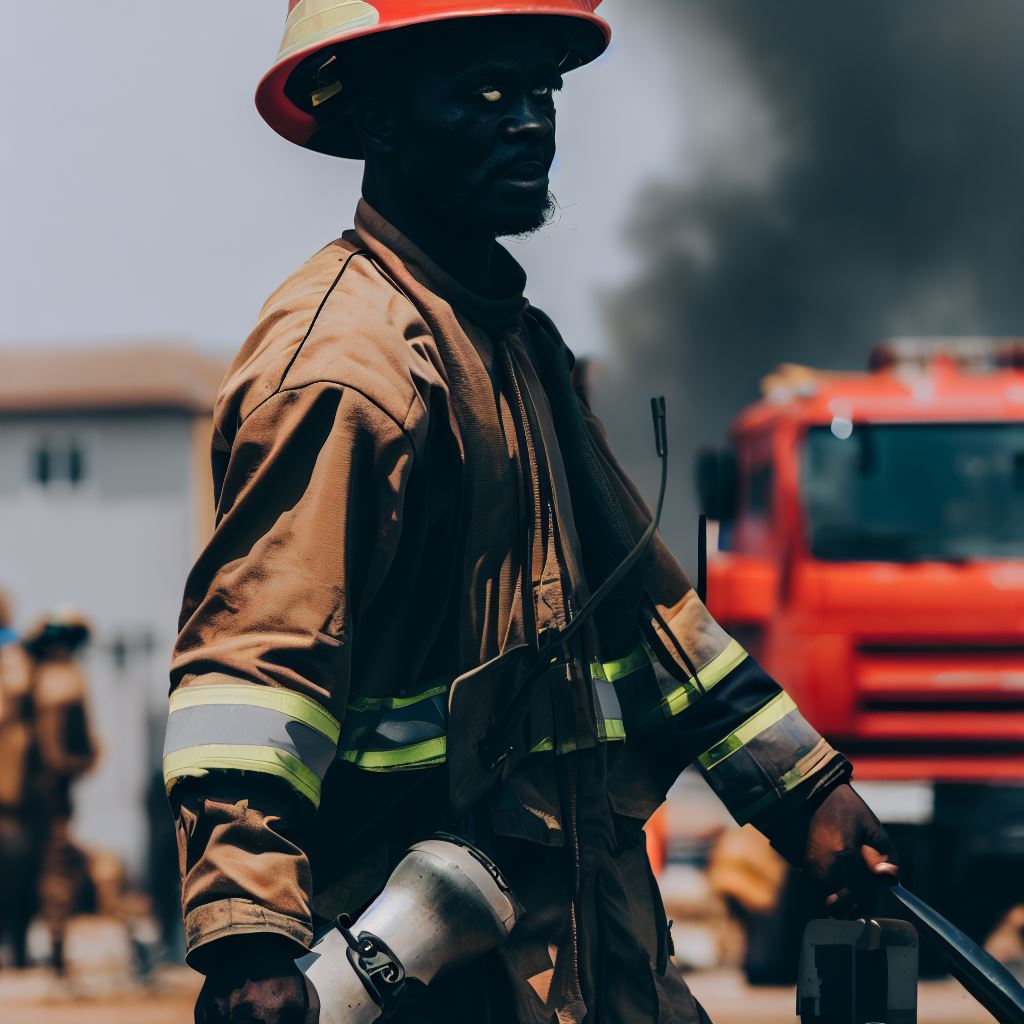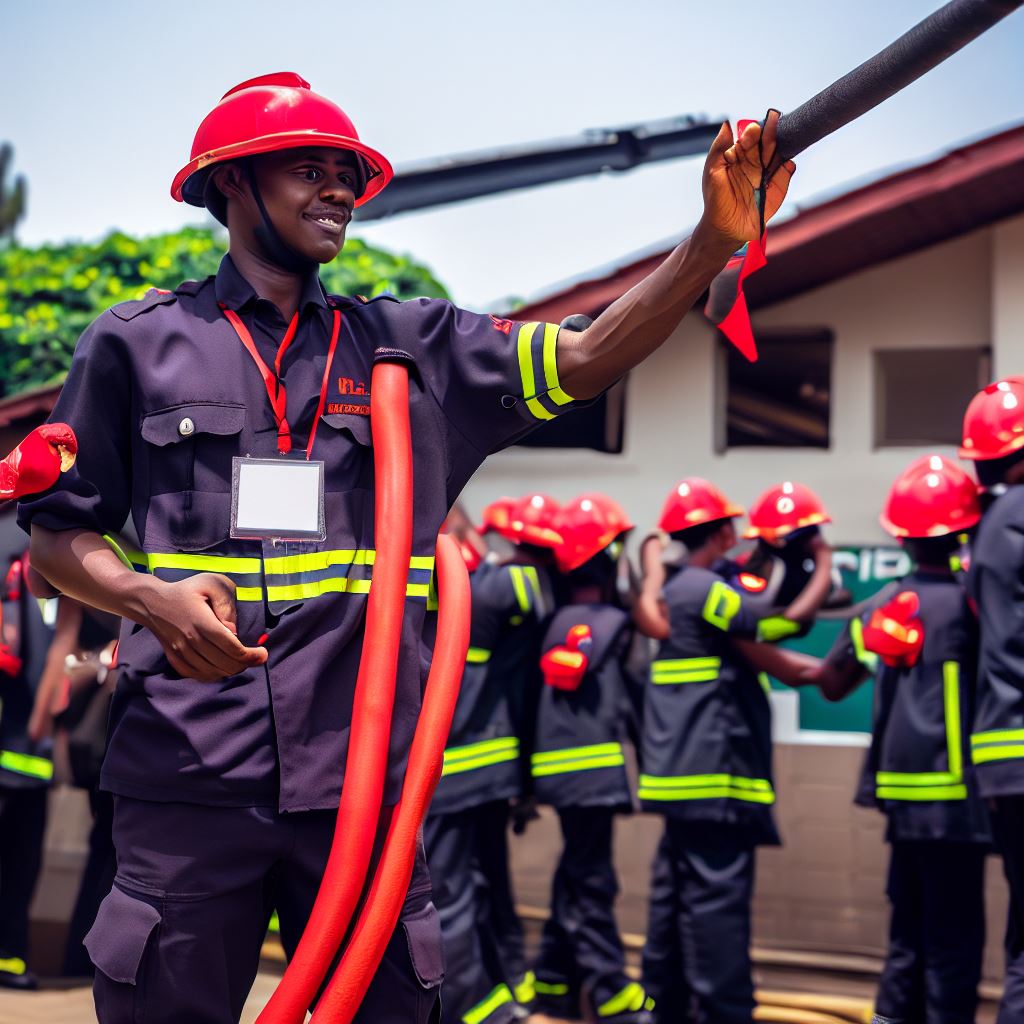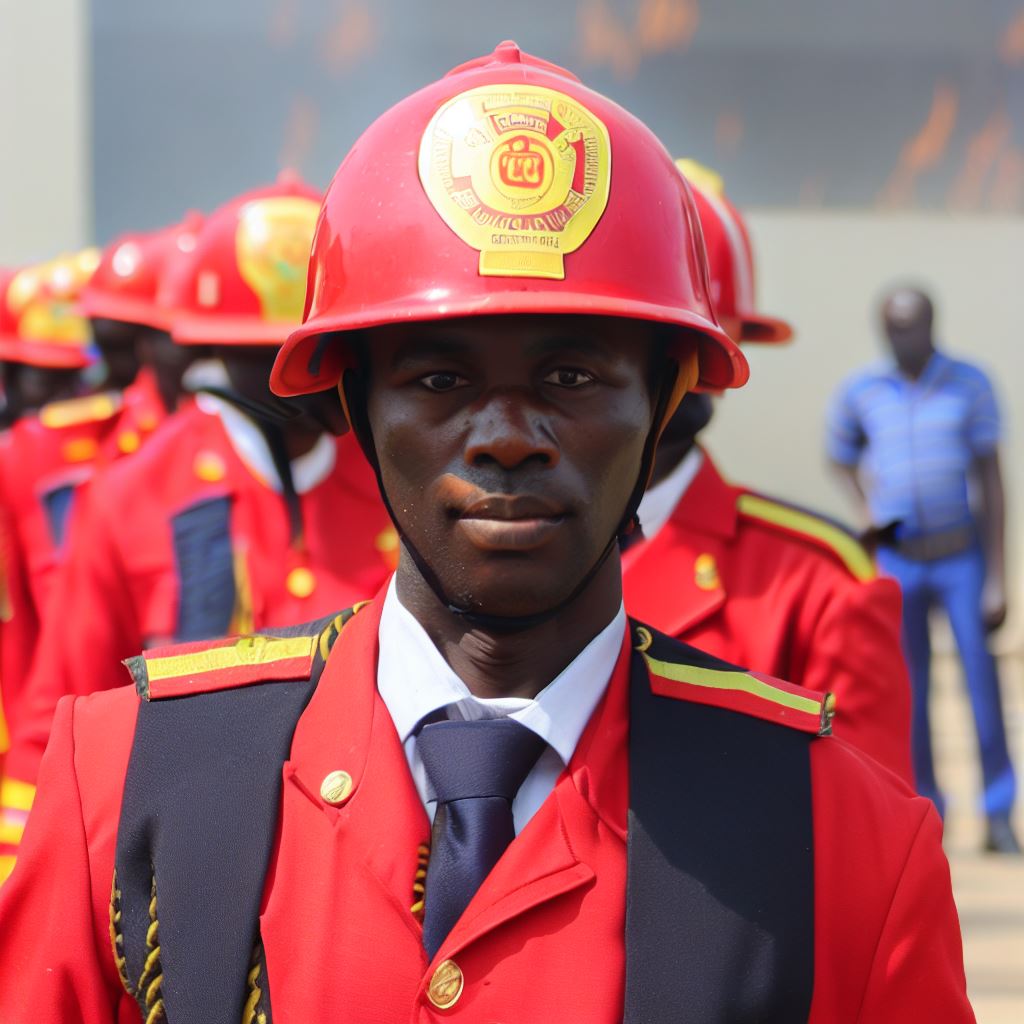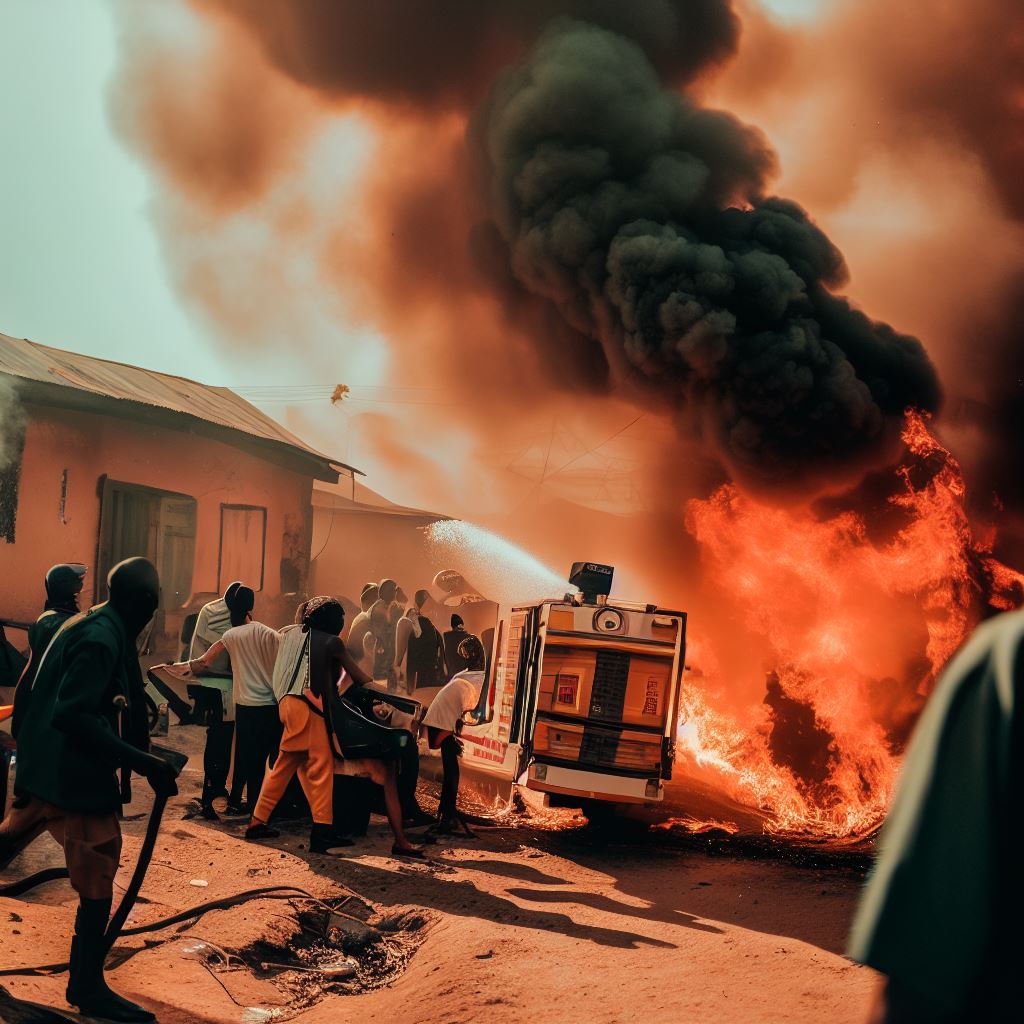Introduction
Firefighters in Nigeria are the unsung heroes who safeguard lives and property in a nation frequently plagued by devastating fire outbreaks.
Their significance cannot be overstated, as they stand as the first line of defense against these fiery disasters.
In a country where fire incidents are regrettably frequent, the role of a firefighter goes far beyond just extinguishing flames.
They are pillars of strength during times of crisis, rushing into danger zones to rescue those trapped, offering medical assistance, and providing emotional support to victims.
These brave men and women exemplify selflessness, facing daunting challenges with unwavering determination.
Their dedication is a beacon of hope in the darkest hours.
In this blog post, we will delve deeper into the incredible efforts and sacrifices of these valiant individuals, shedding light on the essential role of a Firefighter in Nigeria.
Historical Context of Firefighting in Nigeria
A. Early fire fighting methods
- In ancient Nigeria, communities used traditional methods like beating drums and shouting to raise an alarm during fires.
- Local residents formed human chains to pass water buckets to extinguish fires.
- They also utilized natural resources such as sand, leaves, and water to control and contain fires.
- Traditional fire control methods were passed down through generations, forming the foundation of firefighting in Nigeria.
B. Evolution of fire fighting equipment
- With British colonial rule, modern firefighting techniques were introduced to Nigeria in the late 19th century.
- Firefighters started using hand-operated manual pumps, chemical extinguishers, and horse-drawn fire engines.
- Improved fire hoses, hydrants, and motorized fire engines were later introduced to enhance firefighting capabilities.
- Advancements in technology and equipment continue to shape the effectiveness of firefighting in Nigeria.
C. Establishment of fire service departments in Nigeria:
- The Lagos Fire Brigade, Nigeria’s first formal fire service, was established in 1896 under colonial rule.
- Other cities like Ibadan, Kano, and Port Harcourt followed suit and formed their own fire service departments.
- These early fire service departments were primarily staffed by expatriate firefighters from Britain.
- As Nigeria gained independence, more emphasis was placed on training and empowering local firefighters.
- The Federal Fire Service was established in 1963 to coordinate fire prevention and firefighting efforts nationwide.
- Today, each state in Nigeria has its own fire service department responsible for fire safety within its jurisdiction.
In fact, understanding the historical context of firefighting in Nigeria helps us appreciate the evolution of techniques, equipment, and the establishment of fire service departments.
From the humble beginnings of traditional methods to the introduction of modern technology, Nigerian firefighters have demonstrated resilience and adaptability in their duty to protect lives and properties.
Read: Challenges Faced by Sports Massage Therapists in Nigeria
Challenges Faced by Firefighters in Nigeria
Firefighters in Nigeria, often unsung heroes, confront a myriad of challenges in their valiant efforts to protect lives and properties.
A. Lack of Adequate Equipment and Resources
The scarcity of firefighting equipment hampers the effective response to fire incidents.
Firefighters often find themselves ill-equipped, lacking essential gear, water supply, and specialized tools.
This glaring deficiency severely impairs their efficacy on the front lines.
B. Insufficient Training and Education
Inadequate training and education leave Nigerian firefighters ill-prepared to handle complex emergencies and hazardous materials incidents.
Enhanced training programs are imperative to empower them to confront the myriad challenges they encounter daily.
C. Limited Public Awareness and Support
Limited public awareness and support further compound the struggles of Firefighters in Nigeria.
Delayed reporting, heightened risks, and uncooperative behavior during fire incidents persist due to this lack of awareness.
In fact, addressing these challenges necessitates increased government funding, improved training programs, and comprehensive fire safety education.
By doing so, we can create a safer and more supportive environment for Firefighters in Nigeria, who continue to be unwavering in their commitment to our safety.
Read: Case Study: Success as a Sports Massage Therapist in Nigeria

Find Out More: Tech Innovations in Coating: Nigeria’s Growing Landscape
Inspiring Firefighter Stories in Nigeria
In Nigeria, the brave men and women who serve as firefighters go above and beyond their duty to protect lives, properties, and communities.
Their dedication and heroism often go unnoticed, but it is these inspiring firefighter stories that highlight their extraordinary efforts.
A. Profiles of notable Nigerian firefighters
Among the notable Nigerian firefighters, James Adekunle stands out for his exceptional bravery.
He fearlessly entered a burning building to save children trapped inside, risking his own life to ensure their safety.
His selflessness and quick thinking earned him recognition and admiration from both his colleagues and the community.
Another remarkable firefighter is Aisha Mohammed, who became the youngest female firefighter in Nigeria.
Despite facing skepticism and challenges due to her gender and age, Aisha has proven herself to be a dedicated and skilled firefighter.
Her determination to excel in a male-dominated profession has become an inspiration for many aspiring female firefighters.
Ibrahim Usman, a veteran firefighter, is renowned for his exemplary leadership skills.
He has mentored and guided countless young firefighters, instilling in them a sense of discipline and commitment to their job.
Ibrahim’s leadership has positively impacted the efficiency and effectiveness of firefighting operations in Nigeria.
B. Heroic acts and life-saving efforts
Firefighters in Nigeria often find themselves in life-threatening situations, where their heroic acts and life-saving efforts make a significant difference.
Ahmed Yusuf is a prime example of this. In a daring rescue mission, he risked his own life to save a family trapped in a burning house.
His courage and quick response ensured the safe evacuation of the family, making him a hero in the eyes of the community.
Joy Okafor’s bravery and determination were showcased when she rescued an elderly man from a devastating fire.
Despite the intense heat and thick smoke, she navigated the dangerous environment with precision, bringing the man to safety.
Her heroic act received widespread recognition and served as a reminder of the firefighters’ unwavering commitment to protecting lives.
During a massive industrial fire, Samuel Okon’s quick thinking and efficient actions saved several lives.
His ability to analyze the situation, communicate effectively with his team, and execute a well-coordinated rescue operation exemplified the professionalism and expertise of Nigerian firefighters.
C. Examples of firefighters going beyond their duty
Firefighters in Nigeria often go beyond their duty to serve and protect their communities.
In times of natural disasters, such as severe floods, they don’t hesitate to assist in rescue operations, even though it may not fall directly under their domain.
Their willingness to extend their expertise and lend a helping hand showcases their commitment to the community’s well-being.
Emmanuel Adeboye, a firefighter passionate about fire safety, organized programs to educate the public about preventive measures.
Through these initiatives, he empowered individuals and communities to minimize the risk of fires and take necessary precautions. Emmanuel’s efforts have contributed to raising awareness and saving lives.
Furthermore, firefighters often collaborate with local non-governmental organizations (NGOs) to provide immediate relief supplies following major fire incidents.
In coordination with these organizations, they distribute food, water, clothing, and other essential items to affected communities, helping them recover and rebuild their lives.
In short, the inspiring firefighter stories in Nigeria highlight the profiles of notable firefighters, their heroic acts, and their willingness to go beyond their duty.
These individuals embody courage, selflessness, and determination, serving as role models for future generations.
Their unwavering commitment to protecting lives and properties is commendable, and their efforts deserve recognition and appreciation.
Read: Demand and Growth for Sports Massage Therapists in Nigeria
Strategies to Improve Firefighting in Nigeria
A. Government initiatives and policies
- Implement strict regulations and enforcement to ensure fire safety standards in buildings.
- Upgrade fire stations with modern equipment and technology for efficient firefighting operations.
- Increase funding allocation for fire departments to improve infrastructure and training programs.
- Enhance coordination between different government agencies responsible for fire safety and emergency response.
- Develop specialized training programs for firefighters to enhance their skills and knowledge.
B. Collaboration with international fire services
- Establish partnerships and exchange programs with international fire services to learn best practices and techniques.
- Seek assistance and support from developed countries in terms of technical expertise and equipment.
- Conduct joint training exercises and workshops to promote knowledge-sharing and capacity building.
- Participate in global forums and conferences to stay updated with the latest advancements in firefighting strategies.
- Foster international cooperation to tackle potential challenges and emergencies on a regional or global scale.
C. Importance of community involvement and education
- Launch public awareness campaigns to educate communities about fire safety measures and prevention techniques.
- Establish local fire safety committees comprising of community members to address fire-related issues at grassroots level.
- Encourage community participation in drills and mock fire exercises to improve preparedness and response.
- Provide fire safety training sessions for schools, residential areas, and commercial establishments.
- Promote the installation and maintenance of fire detection and suppression systems in homes and public spaces.
Firefighters in Nigeria are at the forefront of safeguarding lives and property from the devastating impact of fires. To bolster their capabilities, a multi-pronged strategy is essential.
Firstly, it’s imperative for the Nigerian government to enforce stringent fire safety regulations, upgrade fire stations with modern equipment, and allocate increased funding for infrastructure and training.
This will empower our Fire Fighters in Nigeria to respond more efficiently to emergencies.
Collaborating with international fire services is another key aspect.
By forming partnerships and participating in joint exercises, our Fire Fighters can acquire valuable insights and expertise from their global counterparts.
Community involvement is equally vital. Public awareness campaigns, local safety committees, and fire safety training can enhance preparedness and prevention.
In general, Fire Fighters in Nigeria are pivotal in ensuring safety.
By implementing these strategies, we can significantly enhance their capabilities and protect our nation from fire hazards.
Read: Tools and Techniques in Sports Massage Therapy in Nigeria
Conclusion
A. Recap of key points discussed
Throughout this blog post, we have explored the fascinating and heroic stories of fire fighters in Nigeria.
We have learned about their bravery, dedication, and the challenges they face in their line of work.
We have discussed the impact of inadequate resources and training, resulting in higher risks for these fire fighters.
Despite these challenges, Nigerian fire fighters continue to demonstrate their commitment to protecting lives and property.
B. Call to action for increased support and recognition of Nigerian firefighters
It is essential to recognize the essential role that Nigerian fire fighters play in our society. They are often underappreciated and lack the necessary support to carry out their duties effectively.
As a community, we must do our part to provide increased support and recognition for these heroes.
This can include advocating for improved funding, better training programs, and updated equipment for fire fighting departments across Nigeria.
Additionally, we can show our gratitude by expressing appreciation for the work they do.
Whether it is through volunteering, organizing events, or simply spreading awareness, we can all contribute to ensuring that Nigerian fire fighters receive the support they need and deserve.
Let us come together and celebrate the resilience and bravery of Nigerian fire fighters. Their stories inspire us and remind us of the sacrifices they make daily.
By taking action and supporting these heroes, we can help make a positive difference in their lives and the communities they serve.




